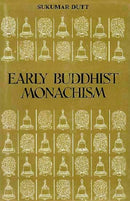About the Book
This treatise on the growth and early development of the Sangha (Buddhist Monastic Order) has often been referred to by scholars as the most complete and masterly treatment of the subject and, as such, invaluable to students of Buddhism.
It has besides a peculiar importance in relation to the history of Indian culture, As the author says, "Indian culture is composite and the Buddhist contribution to it during the two millennia contribution to it during the two Millennia and a half that Buddhism was a living religion in India is so much a part and parcel of it that no true view of Indian culture is possible by ignoring the Buddhist contribution". This contribution was made through the organization of Buddhist monkhood. The author has shown with a wealth of masterly scholarship how this organization was established and developed in India. His chapters on the Patimokkha and Vinaya regulation of the monk community, the growth of conoebium among them, their internal polity and communal life, written from a scientific and historical point of view, are interestingly presented and will hold the general reader. First submitted anonymously as a prize-thesis to the University of Calcutta, it won the Griffith Memorial Prize in 1919. The verdict of the University examiners has been confirmed by Buddhistic scholars the world over who hailed it on its first publication as a work of exceptional originality and of great value in the study of Buddhism and Buddhist history
About the Author
Dr. Sukumar Dutt was born in 1891 at Barisal (now in Bangladesh). He specialized during his academic career in English literature in which he held doctorate. But his interest in Buddhism and ancient Indian history had been roused early in life by his uncle the late Aswini Kumar Dutt, a famous nationalist leader of Bengal of the first three decades of this century. Dr. Dutt had over many years carried on studies in this line and was recognized as one of the most accomplished scholars of Buddhism in this country. He was a Senior Research Fellow of the University of Delhi. His published works are The Buddha and Five After-centuries, Buddhist Monks and Monasteries of India: Their History and Their Contribution to India Culture; Buddhism in History and Culture; Buddhism in History and culture of East Asian People; Mahaparinirbaner Katha (in Bengali).
He was translating 'Bangalier Itihas' by Prof. Niharranjan ray when he died on April 9, 1970
Description
About the Book
This treatise on the growth and early development of the Sangha (Buddhist Monastic Order) has often been referred to by scholars as the most complete and masterly treatment of the subject and, as such, invaluable to students of Buddhism.
It has besides a peculiar importance in relation to the history of Indian culture, As the author says, "Indian culture is composite and the Buddhist contribution to it during the two millennia contribution to it during the two Millennia and a half that Buddhism was a living religion in India is so much a part and parcel of it that no true view of Indian culture is possible by ignoring the Buddhist contribution". This contribution was made through the organization of Buddhist monkhood. The author has shown with a wealth of masterly scholarship how this organization was established and developed in India. His chapters on the Patimokkha and Vinaya regulation of the monk community, the growth of conoebium among them, their internal polity and communal life, written from a scientific and historical point of view, are interestingly presented and will hold the general reader. First submitted anonymously as a prize-thesis to the University of Calcutta, it won the Griffith Memorial Prize in 1919. The verdict of the University examiners has been confirmed by Buddhistic scholars the world over who hailed it on its first publication as a work of exceptional originality and of great value in the study of Buddhism and Buddhist history
About the Author
Dr. Sukumar Dutt was born in 1891 at Barisal (now in Bangladesh). He specialized during his academic career in English literature in which he held doctorate. But his interest in Buddhism and ancient Indian history had been roused early in life by his uncle the late Aswini Kumar Dutt, a famous nationalist leader of Bengal of the first three decades of this century. Dr. Dutt had over many years carried on studies in this line and was recognized as one of the most accomplished scholars of Buddhism in this country. He was a Senior Research Fellow of the University of Delhi. His published works are The Buddha and Five After-centuries, Buddhist Monks and Monasteries of India: Their History and Their Contribution to India Culture; Buddhism in History and Culture; Buddhism in History and culture of East Asian People; Mahaparinirbaner Katha (in Bengali).
He was translating 'Bangalier Itihas' by Prof. Niharranjan ray when he died on April 9, 1970
Payment & Security
Your payment information is processed securely. We do not store credit card details nor have access to your credit card information.


